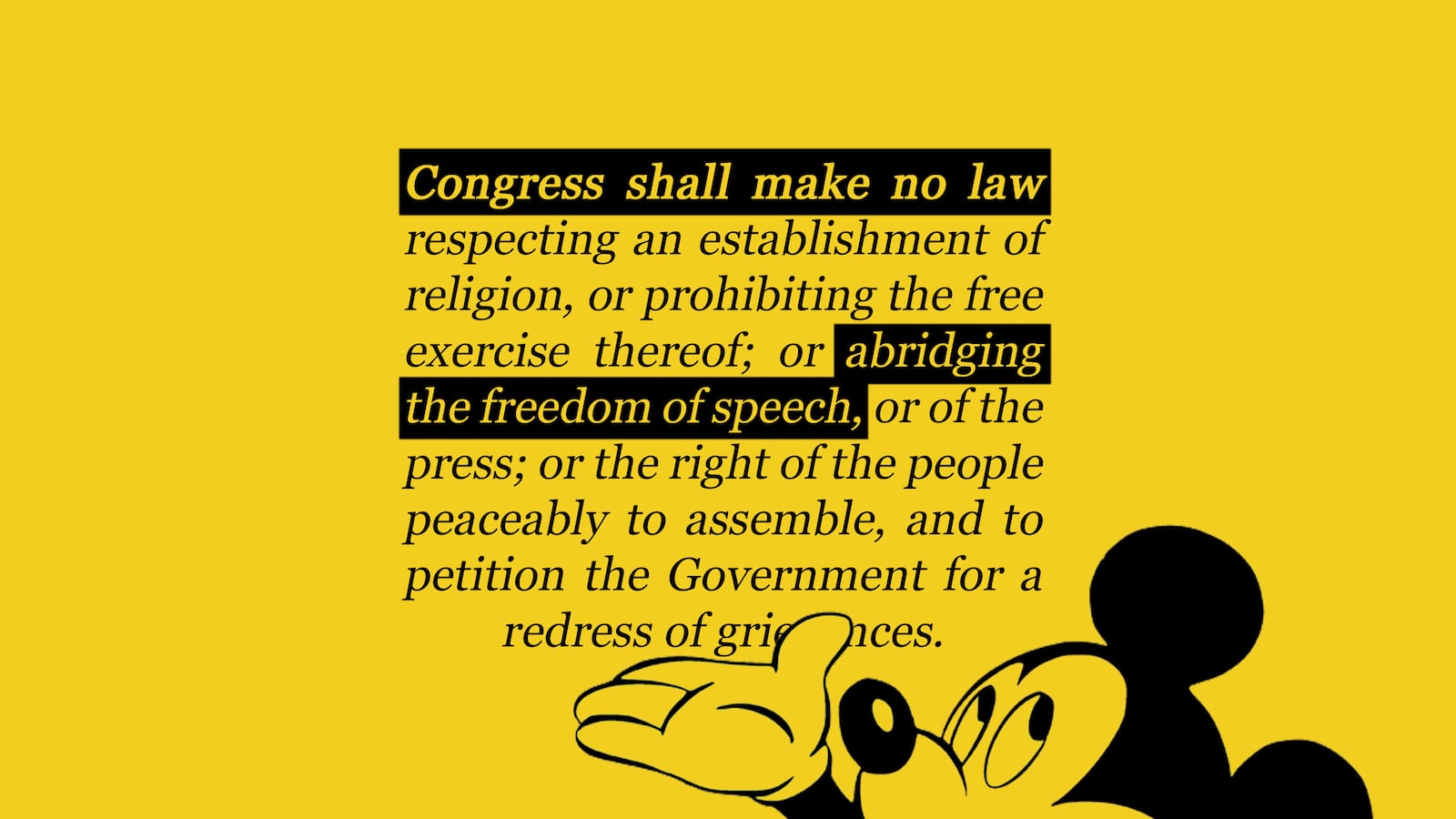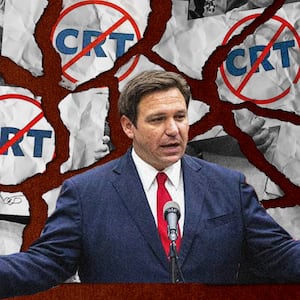If Ron DeSantis has his way, the view from Magic Kingdom could soon include guard towers and razor wire.
Building a state prison near Disney World is just one idea the Florida governor recently floated in his ongoing retaliatory campaign against Disney for publicly opposing his political agenda. While DeSantis’ comment might have been tongue-in-cheek, the reprisals he has already visited on Disney are anything but.
Disney is now suing DeSantis—and the company has a strong claim the governor violated its First Amendment rights.
The saga started in March 2022, when the Florida legislature was on the verge of passing the Parental Rights in Education bill, dubbed the “Don’t Say Gay” bill by critics. The bill (which is now law) bars public schools from teaching students about sexual orientation or gender identity in grades K-3.
Disney joined the national debate over the bill, issuing a statement that it “will not stand for discrimination in any form” and vowing to “oppose any legislation that infringes on basic human rights.” After DeSantis signed the bill into law, Disney said its “goal as a company is for this law to be repealed by the legislature or struck down in the courts.”
In other words, Disney exercised the fundamental First Amendment right that every individual and company has in this country to criticize government action. But that didn’t sit well with the governor.

Ron DeSantis holds a press conference at the Reedy Creek Administration Building in Lake Buena Vista, Florida. DeSantis announced legislative action to nullify the agreement between the Reedy Creek Improvement District and Walt Disney World which was designed to permit Disney to retain control of its theme park and surrounding property.
Paul Hennessy/SOPA Images/LightRocket via GettyAt DeSantis’ urging, the Florida legislature initially responded by voting to sunset the Reedy Creek Improvement District—the special tax district that for half a century enabled Disney to govern the area that is home to its sprawling theme park complex. Ultimately, the legislature renamed the district and placed it under the authority of a new board handpicked by DeSantis.
One of the Disney-controlled board’s last acts was to approve a new development contract and several restrictive covenants, which led to one of the new board’s first moves: voiding those agreements. For Disney, that was the last straw. The company filed suit the same day, raising a host of claims, including First Amendment violations.
It’s true Florida has no obligation to maintain Disney’s self-governing status forever. But the reason the state is revoking it matters.
Two points are critical here.
First, Disney has the same First Amendment right as any individual to speak out on public issues.
Second, the First Amendment prohibits the government from withholding benefits to punish protected speech. The Supreme Court repeatedly has reaffirmed this principle, in many different contexts. A public college could not lawfully refuse to renew a professor’s contract because he criticized the college administration. California could not require residents to sign a loyalty oath to qualify for a property tax exemption. And a Kansas county had no authority to cancel a trash-hauling contract because the contractor wrote editorials in local newspapers criticizing the county government.
Of course, the government can still make these decisions for all sorts of other reasons. It can fire an employee for lack of productivity or eliminate a tax break that creates bad incentives. These are the factors that should influence those decisions—not whether someone dared disagree with a politician.

The sign outside the Reedy Creek Improvement District administrative office building is seen at Walt Disney World in Lake Buena Vista, Florida the day after Florida Gov. Ron DeSantis signed a bill dissolving the theme park as a special purpose district.
Paul Hennessy/SOPA Images/LightRocket via GettyThe question then becomes: What motivated the government’s efforts to deep-six the Reedy Creek Improvement District, which had existed since 1967 and was one of 1,800 special tax districts in the state? Disney’s complaint and the public record give a clear answer: Disney’s vocal opposition to a law supported by the governor.
DeSantis himself admits, seemingly every chance he gets, that this was his motive. Shortly after Disney came out against the Parental Rights in Education bill, he said “Disney and other woke corporations won’t get away with peddling their unchecked pressure campaigns any longer.” In a subsequent interview, DeSantis admitted he had warned Disney’s then-CEO Bob Chapek not to jump into the debate around the bill, telling him, “It’s not going to work out well for you.”
After Disney called for the law’s repeal, DeSantis said the company had “crossed the line.” And in a recent op-ed, DeSantis wrote, “Leaders must stand up and fight back when big corporations make the mistake, as Disney did, of using their economic might to advance a political agenda.”
DeSantis’ allies in the Florida legislature were also explicit about the retaliatory purpose of the legislation stripping Disney of its self-governing status.
Rep. Randy Fine, who sponsored the bill to dissolve the special tax district, made his intent plain: “You kick the hornet’s nest, things come up. And I will say this: You got me on one thing—this bill does target one company. It targets the Walt Disney Co.” Sen. Doug Broxson added to the chorus: “It was Disney’s decision to go from an apolitical, safe 25,000 acres and try to be involved in public policy.”
DeSantis has not moderated his commentary in response to the lawsuit. Just last week, he proudly declared that he had successfully intimidated Disney into silence. “Since our skirmish last year, Disney has not been involved in any of those issues,” DeSantis observed, adding, “They have not made a peep. That ultimately is the most important—that Disney is not allowed to pervert the system to the detriment of Floridians.”
While DeSantis has also lambasted Florida’s former arrangement with Disney as the “most egregious type of corporate welfare you can believe,” he will have a hard time persuading the court that Disney’s speech was not a significant motivating factor in ending it.

In April 2022, Florida Gov. Ron DeSantis signed HB 7, known as the "Stop WOKE' bill in Hialeah Gardens, Florida.
Daniel A. Varela/Miami Herald/Tribune News Service via GettyThis case isn’t the first time DeSantis has run into trouble with the First Amendment. In 2021, a federal court halted enforcement of a Florida law DeSantis championed that would violate social media companies’ right to decide what speech appears on their platforms. That decision was upheld on appeal. More recently, my organization, the Foundation for Individual Rights and Expression (FIRE), successfully sued Florida to stop enforcement of the Stop WOKE Act, which unconstitutionally restricts how public university faculty can discuss race and sex in the classroom.
Even those who think Disney has gone “woke” should be troubled by any political leader’s readiness to leverage state power to stifle dissent, and the precedent that sets.
Today it’s punishing Disney for expressing a political opinion. Tomorrow it could be Chick-fil-A, Bass Pro Shops, or some little-known small business or individual. The right to speak shouldn’t depend on which banner you’re flying in the culture wars, or whether you are willing to bow down before a politician.
When people can lose their jobs or suffer financial consequences for criticizing government officials and policies, the predictable result is self-censorship. The loss of those voices reinforces incumbent officeholders’ grip on power by tilting public discourse in their favor, with lasting damage to our democracy.
“At the heart of the First Amendment,” Chief Justice William Rehnquist wrote for a unanimous court in Hustler Magazine v. Falwell, “is the recognition of the fundamental importance of the free flow of ideas and opinions on matters of public interest and concern.” If Disney’s lawsuit succeeds, it will be a powerful reminder that a politician’s desire to win a culture war battle can never supersede the First Amendment.
Aaron Terr is director of public advocacy at the Foundation for Individual Rights and Expression (FIRE).










